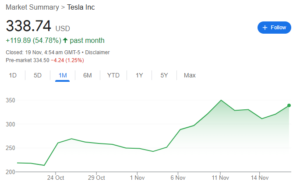Is It the Right Time to Buy Tesla Stock Post-Election? How Trump’s Policies Could Shape Its Future

Department of Government Efficiency or “DOGE” is a department in Trump’s new administration where Elon Musk, CEO of Tesla, will serve as the co-chair. Musk plans to contribute to the country’s efficiency through this cabinet. Trump’s political campaign for the Presidential election of 2024 was closely supported by Tesla’s CEO, Elon Musk. Donald Trump referred to This tech billionaire as “A star is born” during his victory speech.
Musk’s influence could grant him considerable power over government policies that oversee his six companies, ranging from Tesla to SpaceX. Together, these companies have received approximately $15.4 billion in federal contracts over the past decade.
Tesla, an EV market leader, has consistently attracted investor interest due to its technological advancements, strategic positioning in the EV sector, and CEO Elon Musk’s influence. Now that Trump is back in the White House, how might his policies influence Tesla? How could those policies, if implemented, impact Tesla’s stock and growth potential? Let’s explore.
The Current State of Tesla and the EV Market
Tesla remains a powerhouse in the EV industry, with a market capitalisation of over $800 billion. As of 2023, Tesla achieved a profit margin of around 13% and maintained strong returns on equity, indicating robust profitability even amid economic downturns. However, Tesla’s valuation remains vulnerable to government policies and economic factors, especially those affecting consumer demand for EVs, the tax credit system, and supply chain stability.
EVs accounted for approximately 10% of new car sales in the U.S., a relatively small share compared to Europe and China. Government policies had previously boosted the EV market, but future policies, under the Trump administration, may cause changes to Tesla’s growth trajectory.

Return of Trump and EV Incentives
Trump’s stance on EVs has historically been more reserved compared to the previous administration. During his campaign, Trump supported the traditional oil and gas sectors. However, with Elon Musk backing Trump’s victory, it is natural to expect that Trump’s view may become more pro-EV. Trump has the potential to roll back numerous environmental regulations, which could impact Tesla’s U.S. sales in 2025 and beyond.
Trump has voiced strong support for U.S.-based manufacturing, which positions Tesla favourably. This could benefit Tesla if policies are enacted to incentivise domestic production. Tesla’s facilities in Nevada and Texas align well with the “Made in America” focus, helping the company avoid potential tariffs or restrictions on foreign-sourced materials that may affect competitors manufacturing abroad.
Trade and Tariff Policies
Another aspect to consider is Trump’s stance on trade and tariffs, particularly regarding China. Tesla has a substantial production base in China, with its Shanghai Gigafactory being a key player in supplying Asian markets. During Trump’s previous administration, tariffs on Chinese goods led to higher costs for U.S.-based companies importing from China, impacting Tesla’s supply chain. Should Trump increase tariffs on Chinese imports, Tesla’s cost structure could be affected, making production and material costs more volatile.
China represents one of Tesla’s largest markets and accounts for around 30% of its global sales. Any restrictions on U.S.-China trade relations could impact Tesla’s growth in the region, limiting its expansion plans. Nevertheless, Tesla has shown resilience and adaptability in navigating complex geopolitical climates, often passing additional costs to consumers when necessary.
How Tesla Thrived in a Volatile Environment?
Tesla has formulated ways to tackle fluctuations in international relations and potential material shortages. By securing lithium and battery supplies through partnerships, Tesla aims to reduce dependency on foreign supplies. Additionally, Musk’s focus on advancing Tesla’s autonomous driving technology could secure Tesla’s place in the automotive market, independent of EV-specific incentives. If successful, this strategy could help Tesla maintain profitability amid shifting policies.
Tesla’s Full Self-Driving (FSD) beta programme continues to make huge strides, aiming to create an army of self-driving cars. If regulatory bodies approve autonomous driving on a large scale, Tesla’s vehicles could cater to a broader market, beyond traditional car buyers, reducing dependence on EV-specific incentives.
Tesla is also expanding its business model beyond EVs. Its ventures into solar energy and energy storage solutions (e.g., Powerwall and Powerpack) provide diversified revenue streams that can compensate if EV demand fluctuates. These ventures position Tesla as a full-scale energy solutions provider, which is appealing regardless of changing policies.
Tesla’s Financial Health
Tesla’s financial health has significantly improved in recent years. The company reported substantial revenue of $25.182 billion in the third quarter of 2024, marking a year-on-year increase. Notably, Tesla achieved a net income of $2.167 billion during the same period, demonstrating its profitability. Tesla’s profit margin remains among the highest in the automotive industry, highlighting its ability to sustain profitability during periods of market uncertainty.
While Tesla faces increasing competition in the EV market, its strong financial performance and innovative strategies position it as a dominant player. Tesla maintains a strong cash position, giving it the flexibility to invest in new Gigafactories, research and development, and acquisitions to bolster its market position.
Investor sentiment surrounding Tesla also remains positive. In recent quarters, analysts have consistently recommended Tesla as a buy, primarily due to its ambitious growth plans and market dominance. The company’s focus on increasing affordability, through strategies like leasing options, has allowed it to capture a diverse customer base.
Key Takeaways for Investors
Changes in federal EV incentives could impact Tesla’s U.S. sales. Along with that, reduced tax credits may slightly shift the demand for EVs, but Tesla’s affordability strategies and U.S.-based production offer resilience in this uncertain environment. While the company’s position is strong, increased tariffs or trade restrictions could challenge its supply chain. Tesla’s robust financial health, significant market share, and diversified production suggest it is well-positioned to persist through unforeseen political changes.
One of Tesla’s major advantages is its loyal customer base. As a symbol of innovation, sustainability, and progressive thinking, Tesla’s brand identity serves as a hedge against political and economic uncertainties. Its consumer base remains willing to invest in EVs even during reduced incentives.
Post-Election: Consider Tesla
The U.S. stock market often reacts to presidential elections, with many investors seeking stability. A favourable business environment often triggers bullish sentiment. Post-election dynamics may shape Tesla’s stock in the short term, depending on how investor confidence aligns with Trump’s policies on EVs, taxes, and industry support. If policies favour pro-business initiatives that benefit the tech and automotive sectors, Tesla could see strong investor confidence, boosting its stock value.
For potential investors, Tesla’s stock presents both opportunities and risks post-election. If Trump’s policies favour domestic production and promote U.S.-based manufacturing, Tesla could benefit. However, potential reductions in EV tax credits and possible trade restrictions with China may create challenges. As always, investing in Tesla requires careful consideration of both potential high returns and the volatility of the EV market.
Conclusion
Tesla remains a compelling investment option for those prepared to endure short-term volatility to achieve long-term gains. The partnership of Musk and Trump in the White House could significantly influence the company, making it essential for investors to evaluate ongoing trends in the EV market carefully.
The outcome of the 2024 election has brought new dynamics to the EV industry. Still, it is up to investors to consider Tesla’s innovative strategies and ability to thrive amid changing policies before making decisions.
What are the Best ASX Stocks to invest in right now?
Check our buy/sell tips

Blog Categories
Get Our Top 5 ASX Stocks for FY26
Recent Posts
DroneShield’s European Order Book Tops A$111M, Is the Stock a Buy Ahead of the EU $800B Defence Spending Boom?
Europe Reloads as €150B Defence Spend Sparks Fresh Growth Momentum DroneShield (ASX:DRO) has staged a sharp recovery, rising more than…
CurveBeam AI (ASX:CVB) Jumps 20% as China Greenlights A$4M Equity Injection
CurveBeam AI Gets the Green Light CurveBeam AI (ASX:CVB) shares surged 20% today after the company received formal China ODI…
4DMedical Hits All-Time High as UC San Diego Begins Commercial Use of CT VQ
4DMedical Takes Flight 4DMedical (ASX:4DX) announced today that UC San Diego Health has commenced commercial clinical use of its CT…


